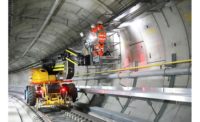In a new report on London’s Crossrail, the U.K. National Audit Office says the beleaguered transportation project is around two years late and nearly 20% over budget because of poor management. The NAO, charged by Parliament with monitoring public spending, pointed to ill-conceived “aspirational” plans that proved to be unfit for the technologically challenging and vast program when things went wrong.
“There have been a number of choices made in the course of this project that have clearly damaged public value,” comments Amyas Morse, head of the NAO. Throughout the program, the delivery company Crossrail Ltd. (CRL) “clung to the unrealistic view that it could complete the programme to the original timetable, which has had damaging consequences.”
The 118-km east-west railroad, known as the Elizabeth Line, will include upgrades of existing track on either side of London. It will pass beneath the city center in 42 km of new twin tunnels and six underground stations. Budgeted at $19.4 billion in 2010, Crossrail's available funding has risen by $3.7 billion while the opening date has been put back from last December to sometime between October 2020 and the following March.
Crossrail’s compressed schedule, contract structure, loss of downward pressure on costs and absence of achievable plans “were set against an atmosphere where ‘can do’” contributed to the failure to achieve goals, according to NAO. Despite last December’s deadline, CRL “did not start to produce a sufficiently detailed delivery plan…until late 2018,” it adds. That left CRL with “a gap in its understanding of delivery risks.”
CRL had been established jointly by the Dept. for Transport and Transport for London, which set the program requirements and deadline. But by providing the company “with a high degree of autonomy”, the sponsors retained little scope to influence progress “particularly towards the later stages,” note the auditors.
According to NAO, the central section’s overall cost rose by $3.3 billion between 2013 and last year, with most of the 36 main civil and fit-out contracts experiencing escalations. Track and key systems installation work in the tunnel had the biggest increases, along with stations at Whitechapel, Bond Street and Paddington.
Among the main cost rise causes cited by CRL, contractor claims for start-date delays and other matters, totaled $1.2 billion. Design change orders contributed $936 million. Schedule changes to meet deadlines added $427 million and scope modifications boosted cost by $260 million. Other factors added another $441 million.
CRL’s progress reports focussed on work done “rather than on the level of risk to successful delivery that remained in the program.” Between 2015 and late last year, CRL had “an aspirational plan designed to improve progress by suppliers, rather than to provide a reality check on overall progress,” say the auditors. Though presented as the critical path to completion, “the plan did not adequately reflect interdependencies across the program.”
Under the original deals, CRL did not require contractors to manage interfaces with other firms. Because of “poor integration of the work of multiple contractors,” the number of compensation claims by contractors for delays caused by factors outside their control reached 16,000 by January 2015, rising to 21,000 a year later.
Aiming unsuccessfully to establish cost and schedule certainty, CRL in 2015 and 2016 negotiated revised terms on some of the target-price deals, which covered 33 of the 36 main contracts. Track, systems, communications and control equipment installation work, for example, changed from target-price to cost-reimbursement contracts.
“While some incentives remained, the main financial incentive for the contractor to control costs was removed,” allege the auditors.
To overcome mounting delays, in early 2018 CRL began running construction and train and signaling system testing in the same space during alternating periods. But because of software development snags, testing achieved “few meaningful results” while interfering with construction progress.
After abandoning last December’s opening date, CRL began negotiating fixed-price contracts for some of the remaining work. “However, this form of contract means that Crossrail Ltd. risks losing commercial levers to ensure that contractors prioritize completion of Crossrail over other projects and opportunities.”
Meanwhile, during last year CRL started winding down its core team in areas such as planning and risk and contract management, ahead of the planned December completion. The company has since scrambled to recruit, telling NAO that it had 143 vacancies in its central delivery teams plus 33 vacancies across the program.
NAO also questions how CRL deployed the companies it hired to support its management effort. In 2009 CRL took on Bechtel as its project delivery partner and the Transcend joint venture of CH2M Hill, AECOM and Nichols Group as program partner.
But rather than keeping these companies “at arms’ length and accountable,” in 2011 CRL absorbed the teams into its organization. This reduced “the commercial” levers available to CRL in managing 36 main contracts and their interfaces leaving it with “all the risk of doing so itself.”
In 2012, CRL Program Director Andy Mitchell told ENR that while having separate management companies was useful during the ramp-up period, the arrangement had too many interfaces and some duplication. He is now CEO of Bazalgette Tunnel Ltd., the developer of London’s Tideway emerging megasewer.
Under Bechtel’s original arrangement, then valued at $524 million, “we'd manage the design contracts for the client and the procurement and construction…Our scope was to do the whole thing,” Ailie MacAdam told ENR in 2012. Then CRL’s delivery director for central section, she is now Senior Vice President and General Manager of Bechtel Infrastructure Asia Pacific.
After the change in Bechtel’s contract with CRL, MacAdam reported to Mitchell “directly as my boss as opposed to as a client,” she added. Bechtel now declines to discuss the project’s progress.




